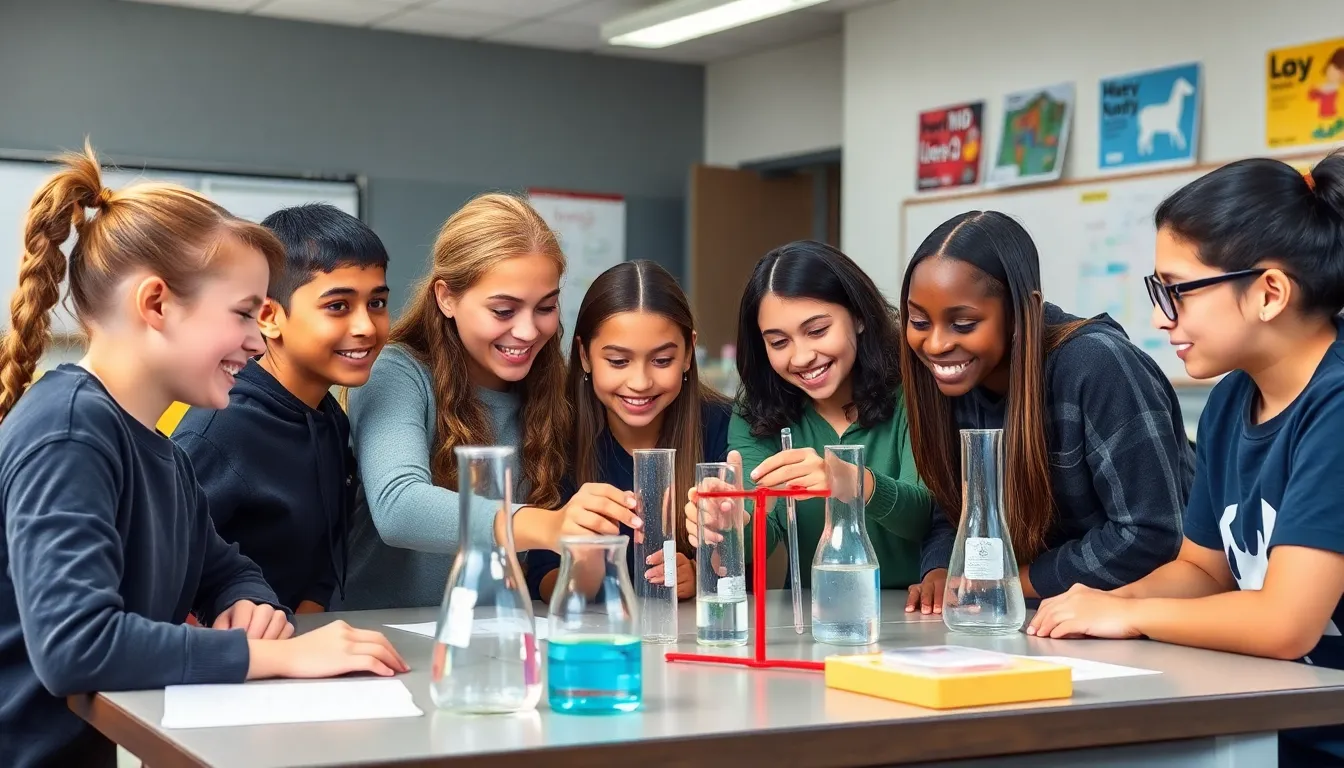Phone:
(701)814-6992
Physical address:
6296 Donnelly Plaza
Ratkeville, Bahamas.

In a world where kids are more likely to recognize a TikTok dance than the phases of the moon, it’s time to rethink how science education is delivered in K-12 classrooms. Imagine a framework that not only ignites curiosity but also transforms students into budding scientists ready to tackle the mysteries of the universe—or at least figure out why the cafeteria’s mystery meat is so… mysterious.
K-12 science education plays a critical role in shaping young minds. A strong foundation in science enhances critical thinking, problem-solving skills, and creativity. Today’s curriculum must engage students through experiential learning, emphasizing hands-on activities and real-world applications.
The framework promotes inquiry-based learning. Instead of rote memorization, students explore scientific concepts through experiments and projects. Classes often incorporate technology, allowing students to gather data and analyze results digitally. This method caters to diverse learning styles, ensuring all students remain actively involved in their education.
Collaboration fosters deeper understanding. Group projects enable students to discuss ideas and share perspectives. Working together encourages them to communicate effectively and develops essential teamwork skills. These group interactions often lead to richer scientific discussions, sparking curiosity and motivation.
Real-world relevance remains paramount. Integrating environmental issues, health sciences, and technology into lessons helps students connect their learning to current events. Educators can utilize local resources, such as museums or nature centers, to enrich the learning experience. This approach nurtures an appreciation for science beyond the classroom.
Assessment practices must evolve. Traditional testing approaches can limit students’ understanding of scientific concepts. Ongoing assessments, including portfolios and project-based evaluations, provide insight into student progress. This allows for a more comprehensive view of each student’s capabilities and interests.
Overall, K-12 science education needs to prioritize an engaging curriculum. By fostering curiosity and providing relevant experiences, educators can inspire the next generation of scientists. This focus prepares students to explore and understand the world around them, nurturing lifelong scientific inquiry.

A structured framework significantly boosts K-12 science education. This approach reshapes curriculum development to better align with the needs of modern learners.
Frameworks enable the development of a cohesive curriculum. They ensure that scientific concepts progress systematically from early grades through high school, allowing for deeper comprehension. Integration of interdisciplinary topics promotes connections between science and subjects like mathematics and technology. Resources such as local environmental issues provide context to lessons, making science more relatable. Inquiry-based methods enhance student exploration, encouraging them to ask questions and seek answers through hands-on experiments. Collaboration with educators facilitates the sharing of best practices, resulting in a more innovative educational environment.
Engaging students in science education relies heavily on effective frameworks. Providing real-world scenarios captivates students’ interest, making lessons more relevant. Students often thrive in environments where they can work on collaborative projects, fostering teamwork and communication. Incorporating technology into lessons also enhances interaction and understanding of scientific concepts. Interactive demonstrations and simulations invite curiosity and spark imaginative thinking. Shifting assessments to continuous evaluations helps students receive timely feedback, motivating them to take ownership of their learning journey.
The framework for K-12 science education encompasses several key components that collectively enhance learning experiences for students.
NGSS outlines performance expectations for K-12 science education, focusing on three-dimensional learning that combines scientific practices, crosscutting concepts, and disciplinary core ideas. Effective implementation of NGSS encourages students to engage in scientific inquiry and apply their knowledge to real-world situations. Frameworks aligned with NGSS promote coherence among grade levels, ensuring students build on prior knowledge progressively. Educators benefit from professional development and resources that support their understanding of the standards. Integration of these standards fosters critical thinking and problem solving, preparing students to tackle complex challenges in today’s world.
Inquiry-based learning empowers students to explore natural phenomena through questions, investigations, and experimentation. This approach instills a sense of curiosity in learners, enabling them to formulate hypotheses and draw conclusions from their findings. Engaging in hands-on experiments enhances comprehension of scientific concepts while promoting teamwork and collaboration among peers. Research shows that inquiry-based methods lead to deeper understanding and retention of knowledge. By fostering an environment that encourages exploration, inquiry-based learning cultivates a passion for science, encouraging students to become lifelong learners and critical thinkers.
Integration of technology plays a pivotal role in modernizing K-12 science education. Tools such as simulations, interactive software, and data analysis applications enhance student engagement and understanding of scientific concepts. Educators can utilize technology to create immersive learning experiences, allowing students to visualize complex processes and conduct virtual experiments. Incorporating online resources promotes self-directed learning, enabling students to explore scientific topics beyond the classroom. Furthermore, technology enhances collaboration opportunities, allowing students to work together on projects and share findings easily. Robust technology integration creates a dynamic learning environment that prepares students for future scientific endeavors.
Implementing a robust K-12 science education framework requires focused strategies. These strategies enhance educators’ effectiveness and provide the necessary resources for all students.
Ongoing professional development is essential for K-12 educators. Training sessions that emphasize inquiry-based learning techniques empower teachers to engage students effectively. Workshops focusing on the Next Generation Science Standards (NGSS) provide vital insights into integrating interdisciplinary approaches in the classroom. Peer collaboration encourages sharing best practices and innovative teaching methods. Schools should offer regular retreats or conferences to foster a culture of continuous improvement among educators.
Access to quality resources significantly impacts science education. Schools benefit from partnerships with local science organizations and businesses that can provide materials and expertise. Digital platforms with interactive simulations and experiments engage students and enhance learning. Incorporating online databases enables teachers to access up-to-date information and real-world applications. Ongoing support from district administration ensures that schools receive funding and training for effective resource implementation.
A well-structured framework for K-12 science education holds the potential to transform how students engage with the world around them. By fostering curiosity and encouraging hands-on exploration, this approach prepares young learners for both academic success and real-world challenges. Integrating technology and promoting collaboration further enriches the educational experience, ensuring that students develop critical skills essential for future endeavors.
As educators embrace innovative teaching methods and adapt to modern learning needs, they can inspire a new generation of scientists. This commitment to evolving science education not only enhances understanding but also nurtures a lifelong passion for inquiry. Ultimately, a robust framework paves the way for students to connect scientific concepts with everyday life, creating informed citizens ready to tackle global challenges.